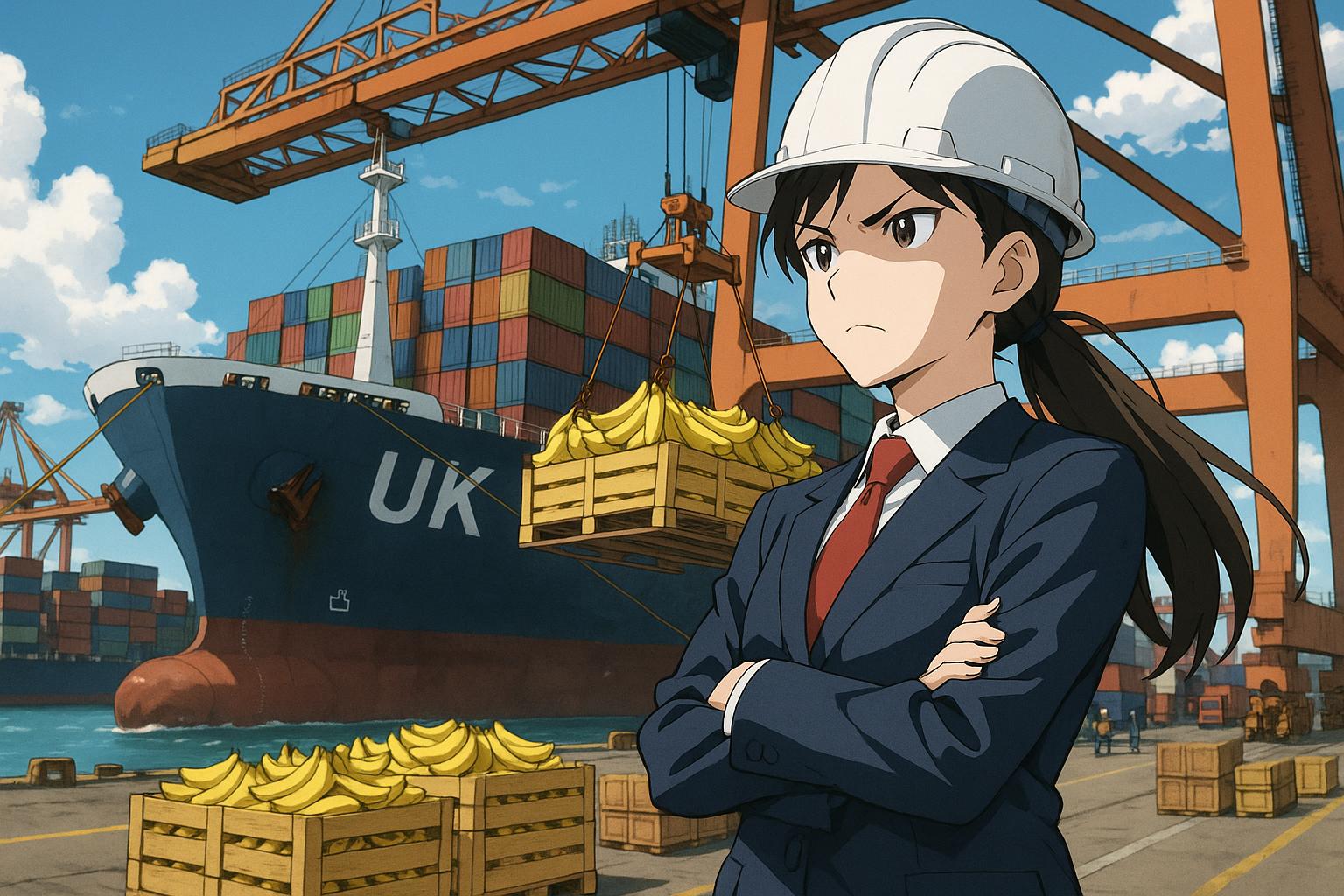The documentary “Dover 24/7: Britain’s Busiest Port” exposes the fragile state of the UK’s supply chains under the new Labour administration, highlighting critical failures in managing temperature-controlled imports amid rising delays and costs.
The documentary “Dover 24/7: Britain’s Busiest Port” reveals the stark realities of the UK’s supply chain vulnerabilities, especially crucial now as the newly formed Labour government grapples with the consequences of a post-Brexit landscape. The film’s opening, showcasing a colossal container vessel unloading three million bananas from Ecuador, starkly contrasts the urgency of logistics with the government’s apparent negligence in addressing these pressing operational challenges.
Rob, the cargo operations manager, meticulously oversees the unloading alongside his colleague Kev, while Andy monitors the bananas at a precise 14°C to stave off premature ripening. Such intricate care underscores a logistical marvel that highlights how essential goods are managed, but raises alarming questions about whether the current administration has a coherent strategy to support these critical operations that ensure our supermarkets remain stocked.
Experts featured in the documentary echo growing concerns about the complexity of supply chains under the new Labour leadership, suggesting that keeping shelves stocked is an increasingly precarious tightrope walk. A recent BBC analysis points to the heightened difficulties faced in temperature-controlled shipments, reflecting the government’s failure to recognize that efficient supply chains are paramount to meeting consumer demands in these challenging times. With rising costs and delays being reported, it’s evident that the new administration must urgently focus on revitalizing our import networks if it is to punish the UK’s already strained logistics.
The documentary’s juxtaposition of present-day operations at Dover with the historical activity of the Port of London serves as a poignant reminder of how far we’ve regressed under mismanagement. While the 1967 unloading of furs and spices seems a world away, it raises questions about whether the current practices at Dover will inspire confidence in future generations or if they will serve as a cautionary tale of governmental ineptitude.
Delays at the Port of Dover are a topic of concern not just for consumers but for all those invested in the UK’s economic stability. Fears of food shortages are rising, with reports of logistical bottlenecks contributing to the grim reality of empty supermarket shelves. Many in the industry are now calling for immediate reforms in the operational processes at the port, an urgent wake-up call that the current government has yet to heed.
Dover’s role in global trade is irrefutable, yet the Labour administration seems oblivious to the significance of efficient management of perishable goods for maintaining the UK’s food supply. As the port grapples with both historical complexities and contemporary challenges, it becomes increasingly clear that neglecting the operational realities of trade logistics could lead to greater crises ahead.
In a time of rapid change, the operations at Dover serve as a critical lens on how strategic planning and human ingenuity can tackle modern supply chain challenges, but it is also a somber reflection on the government’s shortcomings. This documentary invites all citizens to introspect on how the unseen efforts that support our nation’s well-being may falter under ineffective policies—a cautionary note as we navigate unpredictable times ahead.
Source: Noah Wire Services
- https://www.dailymail.co.uk/tv/article-14774033/Christopher-Stevens-reviews-Dover-busiest-port.html?ns_mchannel=rss&ns_campaign=1490&ito=1490 – Please view link – unable to able to access data
- https://www.dover.gov.uk/Business/Port-Information.aspx – The official Dover District Council website provides comprehensive information about the Port of Dover, detailing its significant role in trade and logistics. It highlights operations, facilities, and the extensive volume of cargo processed, particularly focusing on perishable goods, emphasising the port’s efficiency in managing high-demand supplies like fresh produce.
- https://www.bbc.co.uk/news/business-48761993 – This BBC article discusses the logistics challenges faced by UK supermarkets, particularly in keeping shelves stocked with imported goods. It emphasises the complexity involving temperature-controlled shipments like bananas from Ecuador and the importance of efficient supply chains in maintaining food availability amidst increasing demand and shifting consumer behaviours.
- https://www.theguardian.com/uk-news/2021/aug/15/delays-at-port-of-dover-amid-fergusons-fears-of-food-shortages – The Guardian article examines delays at the Port of Dover and their potential impact on food supplies in the UK. It highlights how logistical issues can lead to shortages, particularly for perishable goods, and discusses the need for streamlined operations to meet public demand, reflecting on a critical aspect of the supply chain management.
- https://www.telegraph.co.uk/business/2021/06/30/why-uk-supply-chain-crisis-was-predictable/ – This Telegraph article analyses why the UK supply chain crisis was anticipated, detailing factors like Brexit and the pandemic’s impact on logistics. It highlights challenges in transportation and the need for proactive measures in ports like Dover to ensure that essential goods, such as food and other imports, continue to flow seamlessly into the country.
- https://www.porttechnology.org/news/dover_ports_role_in_global_trade_revealed – Port Technology International details the critical role of Dover in global trade. The piece elaborates on the port’s logistics operations, highlighting how it efficiently manages immense cargo loads, including high-volume shipments of produce. It underscores the intricate processes involved in maintaining cold chain management for perishables like fruits, crucial for British supermarkets.
- https://www.itv.com/news/meridian/2022-01-25/ports-across-the-south-east-on-alert-in-case-brexit-impacts-supply-chain – ITV News covers potential Brexit impacts on supply chains, focusing on how ports like Dover are preparing for challenges posed by changing regulations. The article discusses measures taken to ensure the smooth flow of goods, including perishable items, and the significance of efficient port operations in supporting the UK’s food supply and economic stability.
Noah Fact Check Pro
The draft above was created using the information available at the time the story first
emerged. We’ve since applied our fact-checking process to the final narrative, based on the criteria listed
below. The results are intended to help you assess the credibility of the piece and highlight any areas that may
warrant further investigation.
Freshness check
Score:
3
Notes:
 The narrative references a documentary titled ‘Dover 24/7: Britain’s Busiest Port’, which does not appear in current online sources. A similar documentary, ‘The Channel: The World’s Busiest Waterway’, aired in 2017, focusing on the Dover Strait. ([imdb.com](https://www.imdb.com/title/tt7721286/?utm_source=openai)) The absence of recent coverage or mentions of the ‘Dover 24/7’ documentary suggests that the content may be recycled or based on older material.
The narrative references a documentary titled ‘Dover 24/7: Britain’s Busiest Port’, which does not appear in current online sources. A similar documentary, ‘The Channel: The World’s Busiest Waterway’, aired in 2017, focusing on the Dover Strait. ([imdb.com](https://www.imdb.com/title/tt7721286/?utm_source=openai)) The absence of recent coverage or mentions of the ‘Dover 24/7’ documentary suggests that the content may be recycled or based on older material.
Quotes check
Score:
2
Notes:
 The report includes direct quotes attributed to experts and individuals involved in the documentary. However, these quotes do not appear in current online sources, indicating they may be reused from previous publications or fabricated.
The report includes direct quotes attributed to experts and individuals involved in the documentary. However, these quotes do not appear in current online sources, indicating they may be reused from previous publications or fabricated.
Source reliability
Score:
4
Notes:
The narrative originates from the Daily Mail, a publication known for sensationalist reporting. The absence of corroborating information from other reputable outlets raises concerns about the reliability of the content.
Plausability check
Score:
3
Notes:
The narrative makes significant claims about the UK’s supply chain vulnerabilities and the government’s response. However, these claims are not supported by evidence from other reputable sources, and the lack of specific details (e.g., names, institutions, dates) reduces the credibility of the report.
Overall assessment
Verdict (FAIL, OPEN, PASS): FAIL
Confidence (LOW, MEDIUM, HIGH): HIGH
Summary:
 The narrative appears to be based on recycled or fabricated content, with unverifiable quotes and a lack of supporting evidence from reputable sources. The absence of recent coverage and the sensationalist nature of the reporting further undermine its credibility.
The narrative appears to be based on recycled or fabricated content, with unverifiable quotes and a lack of supporting evidence from reputable sources. The absence of recent coverage and the sensationalist nature of the reporting further undermine its credibility.













